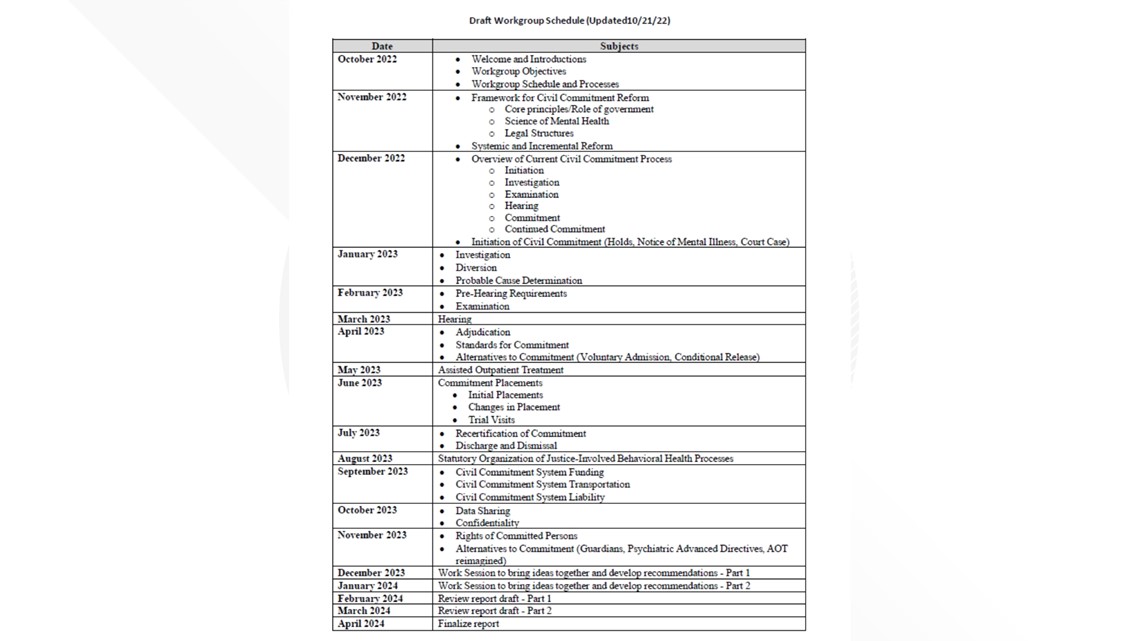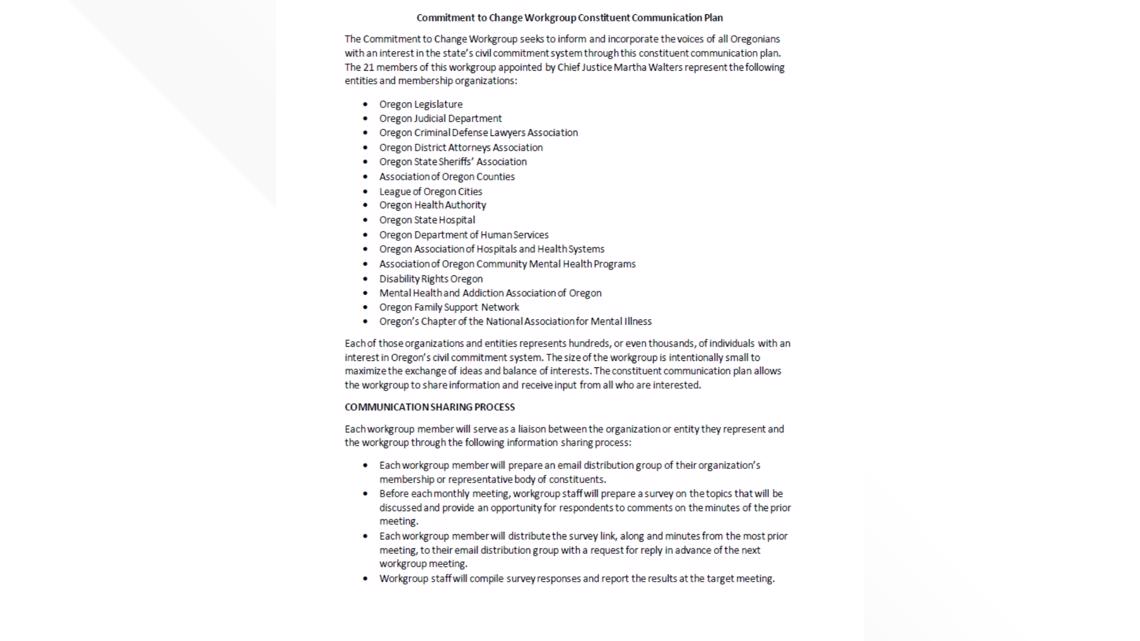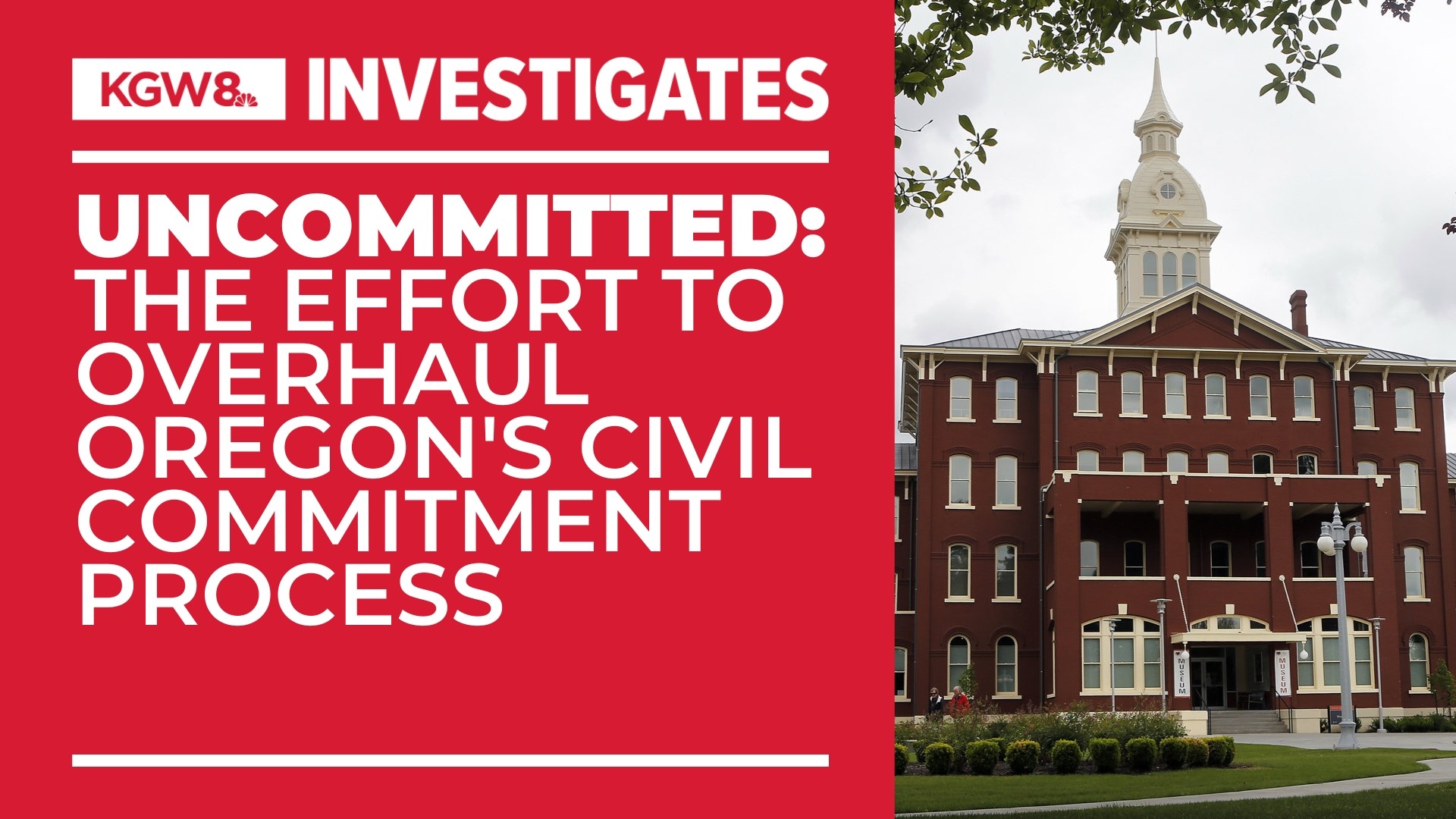PORTLAND, Ore. — A group of Oregon leaders — from judges to doctors to mental health experts — are working to overhaul state standards for civil commitment and forced mental health care amid calls for change.
The Oregon Judicial Department convened the group of 21 panelists, called the "Commitment to Change Workgroup." It started meeting this fall, and the panelists plan to meet each month for the next two years.
In August and September, KGW produced a series of reports titled "Uncommitted," explaining how high state standards for civil commitment are fueling a cycle in which many people don't meet the requirements for involuntary care, but aren't able to care for themselves on their own.
Oregon's threshold for civil commitment — forced mental health care — requires that an individual to be perceived as a serious threat to themselves or others because of their mental illness.
Multnomah County Circuit Court Judge Nan Waller, a workgroup member, said the group plans to re-evaluate the entire state statute to create systemic change in how Oregon provides mental healthcare.
"I think (we're doing this) because we are seeing so many people who are struggling. We see that on the streets, and we know it's covered by the press," Waller said. "A lot of people have a lot of personal experience with it. It seemed like the right time for the judicial branch to step up and say we will try to convene a group that hopefully can come up with some agreements in better ways of doing this."
Answering the call
Family members of people with severe mental illness have called for better options and help for years.
Teri Archuleta, a Troutdale resident, told KGW that her sister, Deanna, died in Portland in October. Deanna was 61 and she lived with bipolar disorder.
Archuleta said her sister’s mental health had deteriorated in combination with addiction, and she wouldn’t agree to treatment or stay on her medication.
"She was found in her tent in a camp by herself — and that's the hardest part, because you always think you're going to have another chance or more time," Archuleta said. "I wish I would have had somewhere to just take her ... if I had a place to take her to get sober and be on her (medication) again, I do believe she would be alive right now."
Archuleta shared photos of her sister with KGW, photos from when they were younger — the way she prefers to remember her sister. She said she wishes Deanna had received mandated treatment and supervised medical care.
"I don't know if it would solve it. It wouldn't solve everyone's problem, and I know that," she said. "But I know it would have helped my sister to have lived longer."
Waller said she hopes the workgroup builds a system that enables better access to mental health treatment and provides treatment to people when they need it, even when some people may turn it down.
A delicate process
The challenge is respecting the civil rights and civil liberties of individuals involved.
When asked why the workgroup plans to take at least two years to create a report of recommendations for the state legislature to review and potentially enact in 2025, Waller said the topic and finding consensus is complicated.
"These are complicated subjects where people have strong positions," she said. "In order to come to consensus on any change, I think that it is going to take time and full examination."


She said fixing the gaps in the current system requires more than minor changes.
"Trying to do a little bit of change along the way (won't be enough), we want to take a look at the whole system because our concern is that small changes are not going to end up with the results that the community and individuals who have serious mental illness need," she said.
The Commitment to Change Workgroup is also seeking input from members of the public through a constituent communication plan, as each appointed member represents a different group of affected individuals.


Members are creating an email distribution list and sending out monthly surveys for feedback on the topics of each meeting. OJD says anyone interested in being added to a distribution list should email Christopher Hamilton at Christopher.j.hamilton@ojd.state.or.us.
The members of the workgroup are:
- Honorable Nan Waller, Multnomah County Circuit Court
- Honorable Suzanne Chanti, Senior Judge
- Senator Floyd Prozanski, Oregon State Legislature
- Senator Kim Thatcher, Oregon Legislature
- Representative Jason Kropf, Oregon State Legislature
- Representative Christine Goodwin, Oregon State Legislature
- William Osborne, Intensive Services Manager, Behavioral Health/Health Systems Division, Oregon Health Authority
- Dr. Katherine Tacker, Psychiatrist, Oregon State Hospital
- Chelas Kronenberg, Case Management Services and Supports Manager, Office of Developmental Disabilities Services, Department of Human Services
- KC Lewis, former Managing Attorney, Mental Health Rights Project, Disability Rights Oregon
- Janie Gullickson, Executive Director, Mental Health and Addiction Association of Oregon
- Sandy Bumpus, Executive Director, Oregon Family Support Network
- Chris Bouneff, Executive Director, National Alliance on Mental Illness Oregon
- Allison Knight, Lane County Public Defender Services, Oregon Criminal Defense Lawyers Association
- Scott Healy, First Assistant District Attorney, Clackamas County, Oregon District Attorneys Association
- Cherryl Ramirez, Executive Director, Association of Oregon Community Mental Health Providers
- Gina Nikkel, Executive Director, Association of Oregon Counties
- Matt Phillips, Clatsop County Sheriff, Oregon State Sheriff’s Association
- Kevin Campbell, Executive Director, Oregon Association Chiefs of Police
- Meghan Slotemaker, General Counsel, Oregon Association of Hospitals and Health Systems
- Dakotah Thompson, Deputy Director of Community Safety, Office of Mayor Ted Wheeler, League of Oregon Cities

